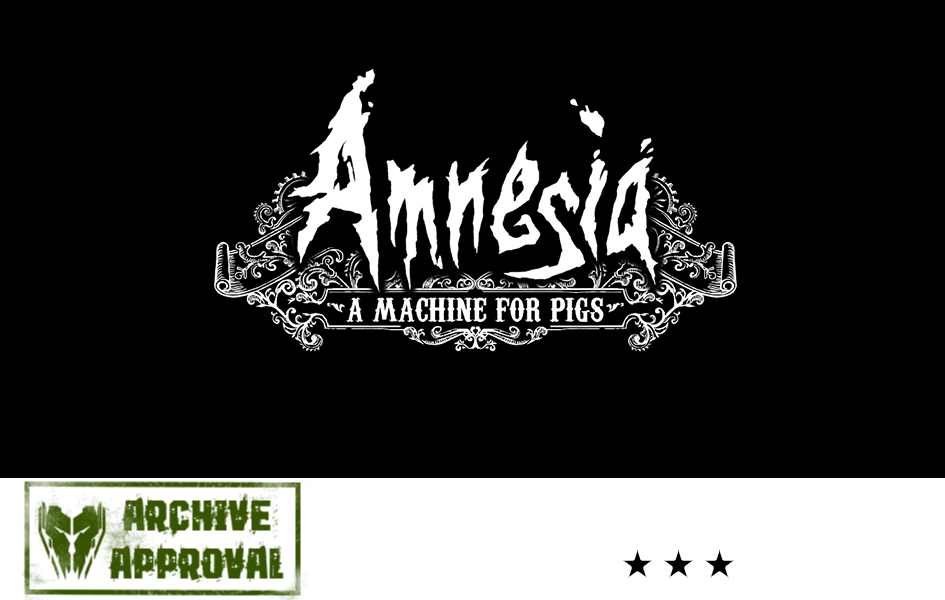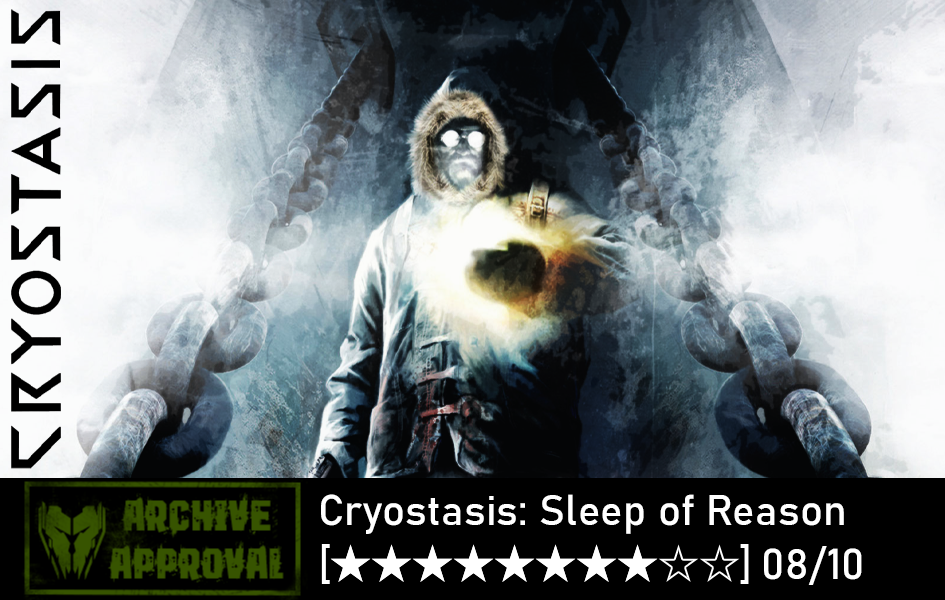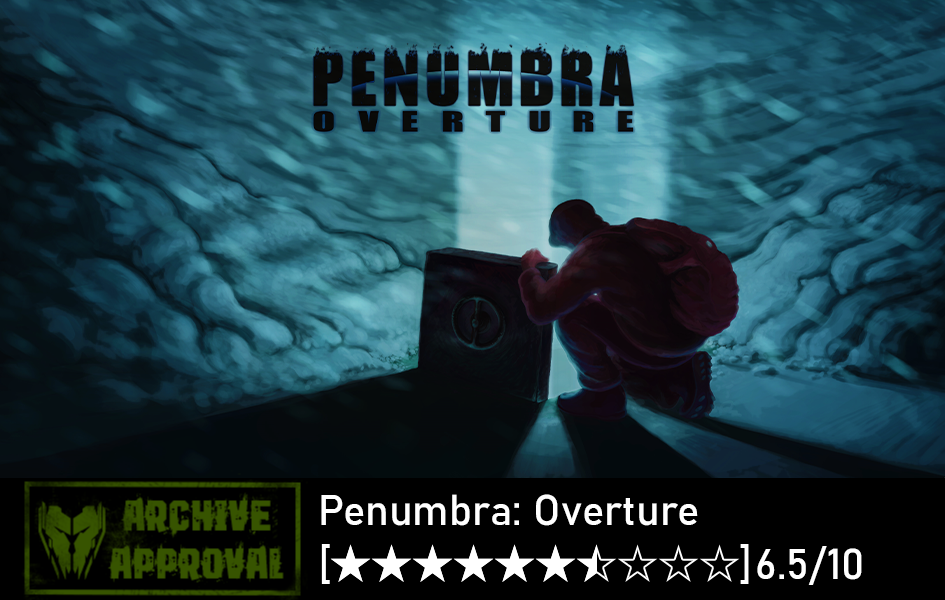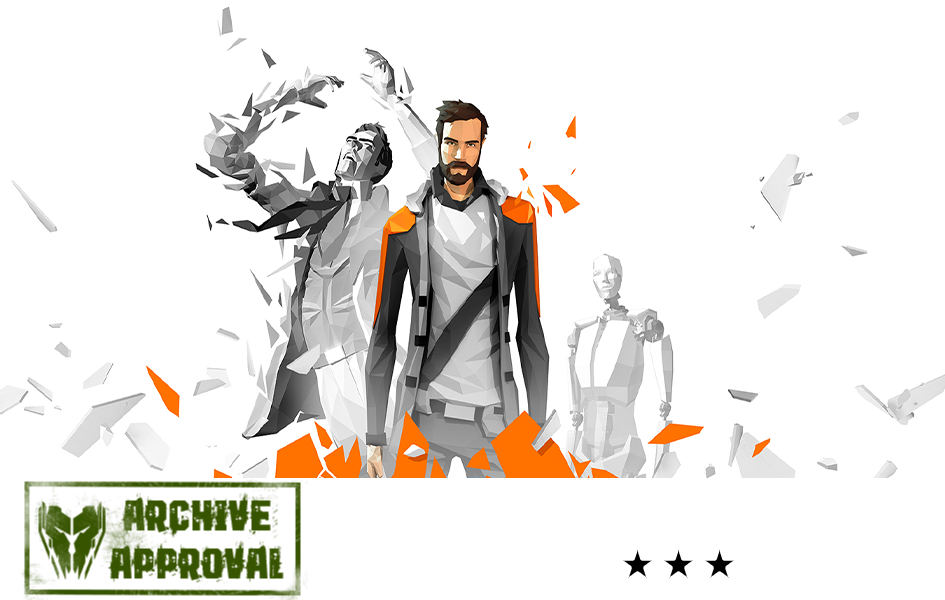[Review] Amnesia: A Machine for Pigs
Amnesia: A Machine for Pigs is an existential horror game, developed by The Chinese Room and published by Frictional Games in 2013. Started development as a mod and is an indirect sequel to Amnesia: The Dark Descent, set in the same universe, loosely tied together via references to its internal mythology.
/// Premise
You take control of Oswald Mandus, a millionaire industrialist from the late 1800s, after a bout of bad fever and memory loss, Oswald wakes up with his children missing while rumblings shake the walls of his mansion. Following the instructions of a mysterious man on the phone, Mandus will venture deep into the underground complex of the machine he has no memories of building, bringing its gargantuan mechanisms back to life in order to save his sons.
/// Gameplay
What do you mean? There is no gameplay, I'm only partially joking. Ok, let's get this out of the way, at its core, A Machine for Pigs is a narrative-driven game. In one fell swoop, it removed, inventory, oil management, sanity system, and most of the puzzle-solving from its predecessor. Everyone hated it for it, and I did for a long time. But it's been almost 10 years now, the series is well and alive, Rebirth is out, and with the recent announcement of Amnesia: The Bunker I decided to go back and give A Machine for Pigs a second look, and this last weekend I found a new appreciation for it in its themes and story.
For the fans, with a single game and community-made mods, The Dark Descent settled a really strong identity for the franchise. And when you release an experimental semi-sequel that does away with a lot of what was considered vital to the series, it was destined to be poorly received. In a way, it's a repeat of what happened with Penumbra: Requiem but this time there is a fantastic narrative to back it up and I think it does outshine Dark Descent in many aspects of its story. However, in pure nerve-wracking horror gameplay, it's a letdown.
So the gameplay revolves around going from place to place, taking in the atmosphere and locations, reading notes, talking to the voice on the phone, solving the odd "bring object here" pseudo-puzzle, and dodging the occasional Pig monster. Horror is subjective but if you are in it for the traditional "run from the spooky monster" you will be very disappointed, the horror in Machine for Pigs doesn't come from the monsters, it's all about the implications of where you are, and what it means or represents.
I was more unsettled by the in-game notes than by anything else. This is a compliment to the superb writing, but also a denouncement of uninteresting monster and encounter design. The notes describe the systematic process in which the machine slaughters and processes the "pigs" and how to maintain and handle the "quality of the living product" in such a disgusting and inhumane way, and yet it's written in such a technical manner that only makes it more disturbing.
Returning to monsters, they are clearly not the focus as mentioned before, but I'm not gonna lie, they kind of suck. There are about 6 encounters total (that you can be detected and actually killed), but the AI doesn't seem to be as relentless or "perceptive" as it was before, the detection range is incredibly short. There are obvious moments where the Manpigs are supposed to be scary, but later in the game, they are there for story purposes and to be a tragic pitiful sight more than anything else, despite their strength they are shown to have the cognitive level of a small child.
Just like Dark Descent, the atmosphere and sound design continue to be excellent in setting a tone of unease. Startling unrecognizable ambient noises blend in and out of the otherworldy music just like before, albeit this time it has a distinct industrial feel to it, with sounds of springs and sharp metal scratchings, all very fitting for the machine. So it has a good horror vibe and a strong plot, but don't expect high-octane turbo horror.
/// Plot or rather, my interpretation of it
So this is where the game really shines for me. It is abstract and interpretative in some points and that's enough to put people off, if you are the type of person that dislike esoteric, vague concepts and wants everything to be neatly explained with logically grounded explanations you will probably want to avoid this one. The magic is all in the interpretation of the analogies made with our real world.
[Full Spoilers ahead]
Oswald Mandus is by all accounts a master engineer when it comes to the research and development of new technologies and devices. After the death of his wife giving birth to his children, and facing financial hardship for his Company, Oswald started to face a decline in his mental health. So he does what rich businessmen of the 1800s did to clear their minds, do a classical colonist-style expedition to an "exotic" country.
Mandus and his children end up going to Mexico, with his expedition delving deep into the Aztec Temple of the Stone Moon. At the sacrificial altar, he finds an Orb. (also referred to as "Stone Egg" the Orbs are Eldritch relics that grant power and impossible knowledge to those who wield it). At the steps of the altar, with Orb in hand he suffers nightmarish visions of the coming century, he sees the death of his sons in the Great War, and in a fit of madness, he sacrifices his children at the altar to spare them that future. And in doing so, he dreams of a machine that could do the same to spare all of mankind.
Side note: Aztec themes are all over the game, but I'm not versed enough in Aztec mythology to feel comfortable exploring them in detail, here, in a game review of all things. But they are there, primarily referencing iconography of their gods and how sacrificing human hearts was needed to keep the sun rising every day.
After that, he returns to England, possessed by the obsession to build the machine. Using the knowledge granted by the orb he built new revolutionary factories, quickly becoming the most profitable meat processing company in England if not the world. Unknown to everyone else, those factories were only the foundations of the machine. With his newly restored wealth Mandus' would funnel all into expanding the machine and his plans of "Salvation".
The massive underground complex purpose is to harvest, torture, process, dismember, and then reanimate and fuse the corpse of kidnapped people with the bodies of pigs. These newborn atrocities are to be the controlled soldiers of the machine and carry out his envisioned armageddon.
But to work the machine will need more than just coal. It needs a soul to operate. With the power of the orb, Mandus rips his heart out and splits his soul in two, putting part of himself in direct control of the mechanical beast. This soul shard quickly becomes its own entity and is the voice we hear taunting Mandus on the phones and speakers throughout the complex. But with the rotten part of his soul gone when Oswald comes back to his senses, he's completely unaware of everything he's done, even oblivious to the fate of his children. And this takes us back to the premise part.
There are a lot of dark implications throughout the story, such as human trafficking, cannibalism, and systematic extermination. It is not a light narrative, but the overarching theme is human exploitation in the industrial complex.
A millionaire without purpose in life sacrifices his soul to build a system whose sole goal is to crush people and fulfill his distorted vision of a "better future". This machine operates in completely dehumanized processes and needs to be fed a constant intake of new people just so it can keep running smoothly, their suffering? Grease for the cogs. In other words, the system is designed with human exploitation at its core. Does this sound familiar in any way? Now that I pointed it out it's easy to see the Machine as a critique of capitalist systems and its devastating effects if left to run unrestrained.
“This isn’t really about a monstrous clockwork AI. This isn’t about mutant pigs. This is about what people do to people all the time.” - Designer Dan Pinchbeck said in an interview with Killscreen
The extremely memorable speech of the Machine at the end solidifies this critique with a healthy dose of anti-war sentiments. Mandus' vision of the future entailed all the horrors humanity was capable of, he saw the rampant industrialism would be the driving engine behind all wars of the 20th century, the trenches, the mustard gas, the holocaust, the nuclear weapons. Conflicts that would bring the death of millions, his children, and many, many, many atrocities. It drove him mad, and so he decided to build the machine in a misguided attempt to "spare" people from the coming horror inadvertently becoming the monster he feared in the first place.
/// Closing thoughts
Gameplay wise Amnesia: A Machine for Pigs is a disappointment. I would go as far as to say it is not scary in the traditional sense. But narrative-wise? If you give it some thought it will hang around your head for far longer than just some monster chasing you in the dark. It is a great reflection on the horror and abuse humans are capable of inflicting on each other and is perhaps the most disturbing narrative the series ever had. If you were mad at it in the past like I was, consider it giving a second chance with a fresh set of eyes and an open mind. You might be surprised.
"I live. I breathe again. I rise, I will rise to bleach the sky and still the water. I will spin the world wheel and set the future upon the path of redemption." - The Engineer
















Comments
Post a Comment